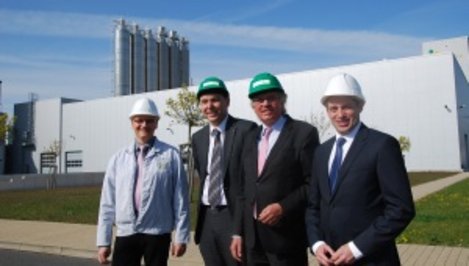Wheat starch from Chemical and Industrial Park Zeitz

Interstarch Deutschland GmbH invests a further 25 million euros in production facilities
Factories can be many things: impressive, efficient and productive. Interstarch GmbH in Alttröglitz has added some more adjectives to the list in its description of its industrial facility. "Welcome to one of the most attractive and modern wheat starch factories in Europe” is how director Dmytro Monich welcomes visitors to Interstarch GmbH at the Chemie- und Industriepark Zeitz industrial estate.
The towering silos reach up to the skies and the plant glitters in the sunlight. All the same, you probably need to be an engineer to appreciate the beauty of such an industrial plant – and an engineer fascinated by starch at that. “Starch has such a wide range of uses – in the food industry, in paper and corrugated cardboard production and in the chemical, pharmaceutical and cosmetic industries – and its production is anything but simple. You need an in-depth understanding of the production processes to get it right”, enthuses the works manager Detlef Müller.
Interstarch GmbH certainly has the process expertise: the company processes 140,000 tonnes of wheat in Alttröglitz every year. The plant produces around 60,000 tonnes of wheat starch – 5,000 tonnes a month – and around 10,000 tonnes of gluten. Gluten is, for example, what helps to ensure that bread and rolls keep their shape, and is therefore an essential element of flour for baking. 50,000 tonnes of premium feed also leave the production plant each month. To produce wheat starch and gluten “made in Saxony-Anhalt”, the facility mills and wet-mills the grain before cleaning and drying the flour produced.
The figures above are no small achievement, for Interstarch’s predecessors got into problems with the same facility. About two years after it was built, Interstarch GmbH acquired the facility in 2011 and restarted, modified and optimised the lines. Five million euros were rapidly invested in technology, and new silos were built in 2014. According to the director Dmytro Monich, the factory reached constant full capacity around a year and a half ago and use of capacity has been increasingly stabilising ever since. The Interstarch management and the staff of nearly 100 have together achieved what many did not expect: successful operation. New products such as gluten-free wheat starch for the food industry have been developed since Interstarch took over, and in 2014, Interstarch Deutschland GmbH joined the association of German grain processors and starch producers (Verband deutscher Getreideverarbeiter und Stärkehersteller, VDGS).
The young company has close links to two Ukrainian starch factories that lead the Ukrainian maize starch market. “We were looking for development opportunities and found them in Saxony-Anhalt”, explained Wladimir Rukawischnikow from Kiev when the partnership was launched. “Modified starch [an Interstarch GmbH speciality] was the perfect specialist product for us”. Modified starch is produced by using chemical processes, enzymes or pressure and heat to change (modify) starch, creating specific properties such as better swelling or greater resistance to heat, cold or acid as required by the customer.
Starch products from Chemie- und Industriepark Zeitz industrial estate are now supplied to customers across Europe. The German starch industry generates around half of its sales outside Germany; two thirds of exports are to elsewhere within the EU and a third to non-EU countries. For the new wheat starch factory in Zeitz, the export business is also an important focus.
Nonetheless, the region remains an important factor. “The benefit of this location is that it is in the heart of the German wheat growing area”, says the Interstarch authorised representative, Johannes Hintermayer. This use of regional resources was also welcomed by Hartmut Möllring (CDU), Saxony-Anhalt’s Minister of Science and Economic Affairs, on a recent visit to the Interstarch GmbH production facility. “The plant is using an agricultural crop that has a long and proud tradition in Saxony-Anhalt.” Mr Möllring was impressed with the company’s development. “I greatly appreciate the fact that the investor has committed to the Alttröglitz site and is even looking to expand here.”
Indeed, the plans are for a significant increase in production capacity over the next few years. “With an annual output of 60,000 tonnes of starch, we are the smallest manufacturer in Germany”, says the Interstarch authorised representative, Johannes Hintermayer. “Greater specialisation is needed to secure the company’s long-term success on the market.” In future, Interstarch intends to produce higher-quality starch for a global customer base. Special starch is required in applications such as glue production, and of course in the food industry. Interstarch will therefore be investing around 25 million euros over the next five years in extending production facilities and developing new processes. The company also plans to set up a dedicated research department to develop new products and extend its product portfolio; work is currently underway on establishing partnerships with local universities.
Interstarch GmbH is seeking further expansion at Zeitz industrial estate. Around 50 different companies now operate on the former site of the Zeitz hydrogenation plant, creating more than 1,000 jobs.
Caption: Plant manager Detlef Müller, authorised representative Johannes Hintermayer, Minister Hartmut Möllring and executive board member Konstantin Medvedyev from Kiev in front of the wheat starch factory.
